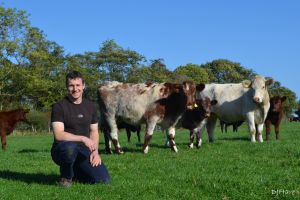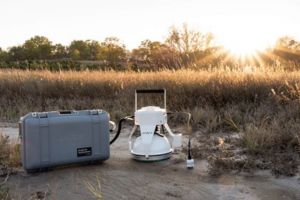Carbon and Biodiversity Experts Help Organic Farmer Monitor Land Regeneration
A Pioneering organic farmer who uses regenerative farming methods to boost biodiversity has been supported by leading carbon and biodiversity offsetting solutions provider CSX.
The company’s environmental data analyst Rhian Trueman, a greenhouse gas and acoustic monitoring specialist, has used remote sensing to assess the carbon and biodiversity changes in farmer Simon Hare’s fields and retrieved valuable data about the health of the soil.
Rhian recently supported him in a specially organised National Farmers’ Union ‘farm walk’ to showcase his regenerative commitments to a group of UK farmers and to educate them on CSX’s monitoring methods.

Rhian, who was assisted by CSX’s biodiversity team member Sophie Atkinson, said: “I’m passionate about the environment and compiling the data that helps farmers and businesses to commit to reducing their carbon footprints.
“I’m used to being out collecting the data in all weathers and we were delighted to explain our work and the equipment we use during the farm tour.”
Simon is renowned for producing 100% grass-fed beef on his organic farm in County Durham, using methods to improve ecosystem health, wildlife and biodiversity.
The CSX team has been helping Simon with his plans, using earth observation technologies and data analysis systems to collect and assess the land’s biodiversity and CO2 emissions.
One of the ways that CSX monitors biodiversity is by using acoustic monitors. Over a four-week period, the monitors record sounds in an area and utilise AI to determine both the variety of bird species, and their abundance.
CSX also uses CO2 monitors to measure the concentration of carbon dioxide in the air. Using this data, it can evaluate how a landowner’s land management practices are affecting the wildlife and the local environment.
“The data tells us a lot about the biodiversity of the area and can better inform farmers as they make decisions about how to use their land,” said Rhian. “I have also produced carbon flux reports for Simon’s farm, using a gas analyser to collect carbon dioxide and methane measurements.”
Simon changed from dairy farming more than a decade ago to producing organic beef, which he supplies to a local farm shop.
Rhian explained: “The land was being intensively grazed but it’s completely organic now, with grass-fed cattle and no fertilisers used. The farm has a rotational grazing system, so the cattle graze down one field, then are moved to another section, several times a day. That allows the grass to grow back which should lead to healthier, less compacted, soil.”
Rhian’s colleague Mark Hopper, CSX’s technical supervisor, said it was important for farmers to access data to increase their understanding of their environmental impact.
He said the government’s new Climate-related Financial Disclosure (CFD) regulations were introducing mandatory climate change reporting requirements for hundreds of large UK firms.
“It means that companies such as fast food chains will need to evidence the environmental impact of their food, how they cooked it, how the meat was transported - and the carbon footprint of the farm that provided the meat, he said. “At CSX we measure and provide the data necessary for these companies to make these assessments to meet their reporting needs.”
Mark added: “Many farmers these days are diversifying, and Simon’s farm has done this very successfully by using organic techniques to bring about environmental change. He’s seeing the results through an increase in bird and grass species and improved soil health - I don’t think many farmers have taken such steps yet.”

Farmer Simon said: “It’s been a learning curve since we first went organic by trying to grow as much grass as possible without using fertiliser. We were spending a lot of money on that and on feed for the cows.
“Grass is one of the cheapest feeds you can grow and the more nutritious it can be will provide a healthier diet for the cows - and I believe it also gives the meat a better flavour, with the nutrients in the grass being passed onto the meat.”
He said the beef, which has a Pasture for Life grass-fed certification, was a rich source of omega-3 - known as ‘healthy fats’ that help with heart function – that had been tested by experts at Newcastle University.
Simon added: “It’s also important to let the pasture recover after it has been grazed. I wanted to make a difference to how we farm and be conscious of our carbon footprint and food miles.
“With the development of the management of the land, looking at how the soil and biodiversity is improving, it has been great to work with CSX to measure and track the metrics. That will aid us in our future decisions and opportunities.”
Caroline Coatsworth, NFU group secretary who organised the farm walk, said: “The recent farm walk, kindly hosted by Simon, was a fantastic opportunity to bring local farmers together and learn about the changes that he has implemented and the effect they are having.
“Food security and exploring ways this can be improved whilst also protecting and enhancing the environment and maximising animal health is vital; to be able to bring all these elements together and learn about them out in the field was incredibly valuable to all who attended.”
Read more about CSX’s work on biodiversity at https://csxcarbon.com/
- Log in to post comments

